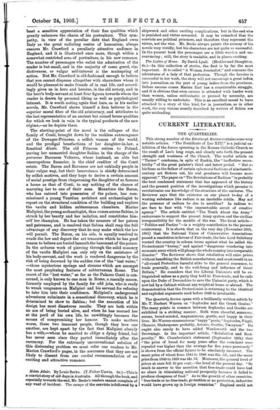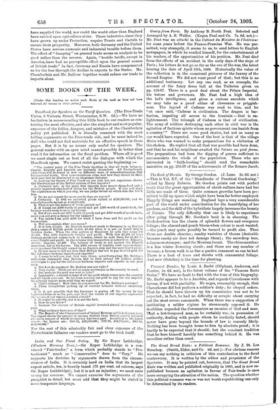C U RRENT LITE RAT U RE.
THE QUARTERLIES.
This strong number of the Edinburgh Review contains some very notable articles. 'The Pontificate of Leo XIII." is a judicial ex- hibition of the forces operating in the Roman Catholic Church as the result of Leo's long reign, and clearly sets forth the present strength and weakness of the Church. The useful article on " Turner " condemns, in spite of Ruskin, the "ineffective eccen- tricity" of the great painter's third and latest period. "But as his fame as the father of certain ephemeral fashions of nineteenth- century art flickers out, his real greatness will become more apparent." The paper on "The Revelations of Radium" is probably the best condensed statement that has appeared of the history and the present position of the investigations which promise to revolutionise our knowledge of the structure of the universe. The Reviewer says that the existence on our planet to-day of a wasting substance like radium is an insoluble riddle. May not the presence of radium be due to aerolites ? In radium we are .face to face with "the impenetrable secret of creative agency." The article entitled "The Truth About the Army" endeavours to support the present Army system and the civilian irresponsibility for the muddle of the war. The fiscal article- " Politics and Parties "—is a weighty contribution to the present controversy. It is shown that on the very day (November 25th, 1891) that the National Union of Conservative Associations passed a resolution in favour of Fair-trade, the late Lord Salisbury warned the country in solemn terms against what he called the Protectionist "heresy," and against "dangerous wandering into economic error which will plunge the whole country into irreparable disaster." The Reviewer shows that retaliation will raise prices without benefiting the British manufacturer, and must result in an "all-round Protection harmful alike to the general consumer, to trade generally, and to the well-being and influence of Great Britain." He considers that the Liberal Unionists will be ex- tinguished unless as a party they hold to Free-trade, and he calls upon the Duke of Devonshire to save the Unionist party, which is now led by a Cabinet without any weight at home or abroad. The demonstration that the Protectionist is returning to the identical and exploded arguments used before 1846 is invaluable.
The Quarterly Review opens with a brilliantly written article by Mr. T. Herbert Warren on " Sophocles and the Greek Genius." The many points in common between Sophocles and Goethe are exhibited in a striking manner. Both were cheerful, sensuous, serene, broad-minded, magnanimous, gentle, and happy in their lives. lair.Warren enumerates as" happy" poets," S op hocles, Virgil, Chaucer, Shakespeare probably, Ariosto, Goethe, Tetonyson." He ought also surely to have added Wordsworth and the two Brownings. In the important article, "Retaliation and Reci- procity," Mr. Chamberlain's statement (September 16th) that ,` the price of bread for many years after the corn-laws were repealed was higher than the average for five years previously" is shown from the official figures to be absolutely incorrect. The mean price of wheat from 1841 to 1848 was 55s. 5d., and the mean price from 1849 to 1853 was 43s. 5d. Moreover, the general level of prices at once fell 10 per cent,—the level of the present day. "So much in answer to the assertion that free-trade could have had no share in stimulating national prosperity because it failed to produce cheapness of food." As to the growth of other countries, "free-trade or no free-trade, protection or no protection, industries would have grown up in foreign countries." England could not
have supplied the world, nor could the world other than England have existed upon agriculture alone. These industries, since they have grown up under Protection, require Trusts and Cartels to ensure their prosperity. Moreover. both Germany and the United States have serious economic and industrial trouble before them. The effect of " dumping " on general trade seems on analysis to be good rather than the reverse. Again, "hostile tariffs, except in America, have had no perceptible effect upon the general course of British trade." In fact, Germany and Russia have compensated us for the loss through the decline in exports to the States. Mr. Chamberlain and Mr. Balfour together would reduce our trade to imports alone.























































 Previous page
Previous page